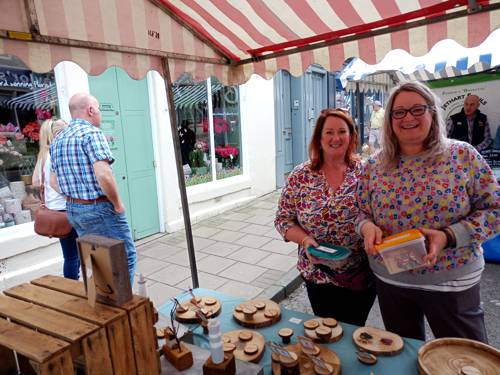
FAQ About The Cultural Impact of Handmade Markets on Local Economies

What are handmade markets?
Handmade markets are event spaces where artisans, craftspeople, and makers gather to sell their unique, handmade goods. These markets provide a platform for small businesses that typically specialize in handmade crafts, art, jewelry, clothing, home décor, and other items. They emphasize the value of creativity, craftsmanship, and originality.

How do handmade markets benefit local economies?
Handmade markets stimulate local economies by providing opportunities for local artisans to sell their products directly to consumers. This helps keep money circulating within the community and creates local job opportunities. Furthermore, these markets attract visitors, which can lead to increased spending in the area.

What is the role of handmade markets in preserving cultural heritage?
Handmade markets play a crucial role in preserving cultural heritage by showcasing traditional crafts and artisanal techniques that might otherwise be lost in mass production. They provide a platform for artisans to share their cultural knowledge and skills, helping to keep cultural traditions alive for future generations.

How do handmade markets promote community engagement?
Handmade markets foster community engagement by bringing people together in a shared space where they can support local artists, participate in cultural activities, and interact with their neighbors. These markets often include live demonstrations, workshops, and performances that encourage community participation and learning.

Can handmade markets contribute to sustainable consumerism?
Yes, handmade markets contribute to sustainable consumerism by offering goods that are typically lower in carbon footprint compared to mass-produced items. Many artisans source their materials locally and employ environmentally friendly practices, supporting a more sustainable and ethical production cycle.

Are there any economic challenges associated with hosting handmade markets?
While handmade markets provide significant benefits, there are challenges such as securing funding, permits, and adequate space, as well as ensuring enough foot traffic. Additionally, artisans might face competition from larger retailers and online markets, requiring continual innovation and engagement to attract customers.

What types of products are typically found at handmade markets?
Handmade markets typically feature a wide array of products, including art, crafts, jewelry, textiles, clothing, home décor, beauty products, toys, and more. The emphasis is on uniqueness and quality, with items often being one-of-a-kind or produced in small batches.

How do handmade markets support small businesses?
Handmade markets support small businesses by providing direct sales opportunities to artisans without the overhead costs associated with traditional retail spaces. They offer platforms for networking, brand recognition, and building customer relationships, which are crucial for small business growth.

What is the significance of handmade markets in cultural tourism?
Handmade markets are significant in cultural tourism as they attract tourists who are interested in experiencing local craftsmanship and culture. These markets often become cultural attractions themselves, showcasing regional art and crafts, thereby increasing cultural visibility and tourism revenue.

How can local governments support handmade markets?
Local governments can support handmade markets by providing funding, infrastructure, and simplified permitting processes. They can also promote these markets through tourism boards and community events to increase attendance and vendor participation.

Do handmade markets help in promoting local artists?
Yes, handmade markets are instrumental in promoting local artists by giving them a venue to display and sell their work. This visibility helps artists build a reputation, reach new audiences, and gain feedback directly from consumers, which is vital for their professional development.

How do handmade markets differ from traditional markets?
Handmade markets differ from traditional markets primarily in their focus on artisanal, handmade goods rather than mass-produced items. The atmosphere is often more intimate and community-focused, with an emphasis on meeting the makers and understanding the stories behind the products.

What economic strategies can enhance the effectiveness of handmade markets?
Enhancing the effectiveness of handmade markets can involve strategies such as targeted marketing, community partnerships, and providing vendors with business workshops to improve their sales techniques and customer engagement. Additional support for e-commerce could also help artisans reach wider audiences.

How do handmade markets impact consumer purchasing decisions?
Handmade markets impact consumer purchasing decisions by offering products with a story and personal connection, which can lead to more intentional buying choices. Consumers are more likely to purchase items that are unique and have perceived higher value due to their artisanal nature.

Why are handmade markets popular among young entrepreneurs?
Handmade markets are popular among young entrepreneurs because they offer a low-risk platform to test new products and business ideas. The flexibility and low-cost entry compared to traditional retail spaces make them attractive to those starting out, allowing them to grow their brand organically.

What role do handmade markets play in job creation?
Handmade markets contribute to job creation by supporting small businesses and encouraging entrepreneurship. They create opportunities not only for artisans but also for support roles such as market organizers, marketing professionals, and those involved in logistics and customer service.

How do online platforms complement handmade markets?
Online platforms complement handmade markets by providing a digital space for artisans to extend their reach beyond local markets, increases sales potential, and engage with customers globally. They serve as an additional channel for promoting and selling handmade goods while providing information about upcoming market events.

What challenges do artisans face when participating in handmade markets?
Artisans face challenges such as high competition, the need for effective marketing, and the unpredictability of sales. They must also manage the logistical aspects of setting up stalls, transporting goods, and ensuring a diverse and attractive product offering to draw in customers.

How do handmade markets preserve artisanal skills?
Handmade markets preserve artisanal skills by providing artisans with a platform to practice and refine their crafts. They encourage mentorship and apprenticeship opportunities where knowledge and techniques are passed down, ensuring these traditional skills are not lost over time.

Why is consumer education important in handmade markets?
Consumer education is crucial in handmade markets as it helps buyers understand the value and craftsmanship behind handmade products. Educated consumers are more likely to appreciate and support local artisans, leading to sustained demand and continued cultural and economic benefits for the community.
